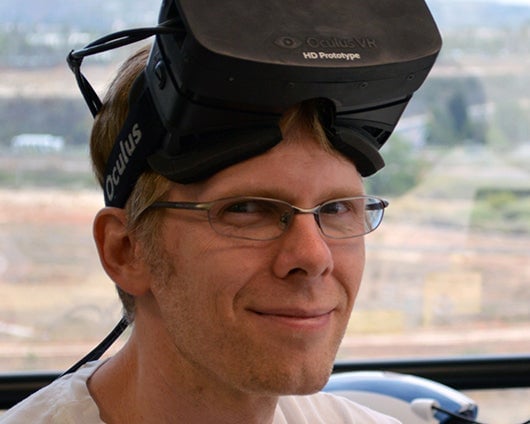Oculus CTO John Carmack disputes claim that he copied code
John Carmack, renowned programmer and Oculus executive, spoke out this week about claims that he developed the Oculus Rift using code he’d written at his previous job.


John Carmack, renowned programmer and Oculus executive, spoke out this week about claims that he developed the Oculus Rift using code he’d written at his previous job.
The claims were made during the ZeniMax Media vs. Oculus lawsuit, which ended on Wednesday (Feb. 1). The jury awarded ZeniMax $500 million after finding, among other things, that Oculus developed its flagship virtual reality product using ”non-literal” copies of code Carmack had written while he still worked at ZeniMax.
“This is just not true,” Carmack wrote on Facebook on Thursday.
In legal terms, a non-literal copy is one that is “substantially similar” to the original. In his post, Carmack disputed the testimony of an expert for the plaintiff, who had told the jury a non-literal copy would be like a duplicate Harry Potter book with only the names changed. It’s not an exact copy, but it still constitutes copyright infringement.
“I agree; that is the literary equivalent of changing the variable names when you copy source code,” Carmack wrote. “However, if you abstract Harry Potter up a notch or two, you get Campbell’s Hero’s Journey, which also maps well onto Star Wars and hundreds of other stories. These are not copyright infringement.”
Carmack, a celebrated game developer who revolutionized the field of computer graphics in the 1990s, left ZeniMax for Oculus in 2013 after becoming enamored with virtual reality. Before his departure, according to the suit, he had been collaborating with Oculus co-founder Palmer Luckey on the development of the Oculus Rift. ZeniMax filed its lawsuit the following year, shortly after Oculus had been acquired by Facebook for $2.3 billion. The suit claimed that Carmack had essentially smuggled out intellectual property he’d developed using ZeniMax’s time and resources, and used it to build the Rift.
The jury cleared Carmack of many of ZeniMax’s accusations, including one that he’d deleted data to cover his tracks in the alleged heist. Carmack was also not found personally liable for any of the $500 million—that was spread out among Oculus itself, Luckey, and former Oculus CEO Brendan Iribe.
Still, the copyright infringement allegation stuck, and as he watched the expert testimony that led to that finding, Carmack took serious issue with the assessment.
“After he had said he was ‘Absolutely certain there was non-literal copying’ in several cases, I just wanted to shout ‘You lie!'” Carmack wrote in his post. “By the end, after seven cases of ‘absolutely certain,’ I was wondering if gangsters had kidnapped his grandchildren and were holding them for ransom.”
Copyright law, particularly when applied to software, is tricky. When Carmack writes about “abstracting up” Harry Potter to the “hero’s journey,” a generic story template defined by Joseph Campbell in 1949, he’s making a well-worn argument about copyrighting code. He’s suggesting that the code in question isn’t so much the thing itself, but an abstraction of the thing:
A hero ventures forth from the world of common day into a region of supernatural wonder: fabulous forces are there encountered and a decisive victory is won: the hero comes back from this mysterious adventure with the power to bestow boons on his fellow man. – The Hero with a Thousand Faces by Joseph Campbell (1949)
The point is that if Carmack and his team wrote the Oculus Rift code from scratch, as he says they did, there are only so many ways to implement the abstract functionality that makes virtual reality work. This is similar to arguments made in the Oracle vs. Google lawsuit that ended last year. Oracle had accused Google of stealing its software interface to the Java programming language for use in its Android devices. Google argued that such code was too low-level to be subject to copyright. Google ultimately won the case, but not before a federal court ruled that interface code is indeed something than can be copyrighted.
On Friday (Feb. 3), ZeniMax released a statement in response to Carmack’s post:
In addition to expert testimony finding both literal and non-literal copying, Oculus programmers themselves admitted using Zenimax’s copyrighted code (one saying he cut and pasted it into the Oculus SDK), and [Oculus VR co-founder] Brendan Iribe, in writing, requested a license for the ‘source code shared by Carmack’ they needed for the Oculus Rift. Not surprisingly, the jury found Zenimax code copyrights were infringed. The Oculus Rift was built on a foundation of Zenimax technology.
ZeniMax has also said it may now seek to stop the sale Oculus Rift headsets. And according to reporting by Polygon, Oculus says it will appeal the verdict.